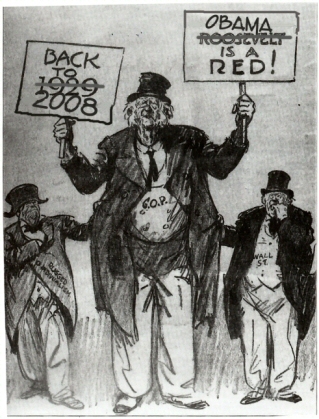Eighty years ago this week, an enormous sound emanated from lower Manhattan and began to spread in waves across the nation and, eventually, the world. The cause of the noise was the collapse of the stock market on "Black Tuesday," October 29, 1929, the worst single day of what was actually a months-long Stock Market Crash that heralded the beginning of the Great Depression.
As we enter the second year of the worst economic collapse since that one, echoes of that distant time can be heard all around us, in the form both of the causes of the present crisis (more on that in a later post)and in the political arguments that reverberate in the halls of Congress and the media.
What conservatives are now saying about President Barack Obama is in many cases exactly the same as what their forebears said about President Franklin D. Roosevelt.
Consider the following political attack:
"Our opponents ... are proposing changes ... which would destroy the very foundations of the American system of life." They have "the same philosophy of government which has poisoned all Europe ... the witch's cauldron which boiled in Russia."
Republicans attacking Barack Obama in 2009?
No, Herbert Hoover attacking Franklin Roosevelt in 1932.
The fear-mongering words on Republican lips now are precisely the same ones they uttered incessantly in the 1930s: "socialism," "government bureaucrats," "centralization in Washington," "government regulation," "massive deficits."
"Let It Be"
And there is this advice on what to do in the face of economic collapse: "Liquidate labor, liquidate stocks, liquidate the farmers, liquidate real estate." While it sounds very much like what Republicans say should have been done in the present crisis, it was the course Treasury Secretary Andrew Mellon urged on President Hoover during the last Depression. The panic would, Mellon insisted, "purge the rottenness out of the system."
This "Let It Be" (which means "let it collapse") approach is just what conservatives advocate today. "I believe the free market always prevails," one of the Tea Party leaders said recently. "I believe [Obama] should have cut taxes and released restrictions on businesses."
For all their complaints about "government interference," the laissez-faire businessmen were in both times happy to seize the benefits of federal intervention when the situation was a t its worst. But the moment the outlook improved for them, they reverted to their unquestioning faith in the Market God.
Obama sees himself, as Roosevelt did before him, as acting to save capitalism, but in neither case did the capitalists show much appreciation for their salvation. A story FDR told to indicate his feelings about the ungrateful attitude of the businessmen and financiers could be reprised by Obama:
"A nice old gentleman wearing a silk top hat fell off the end of a pier. He was unable to swim. A friend ran down the pier, dived overboard and pulled him out; but the silk hat floated off with the tide. After the old gentleman had been revived, he was effusive in his thanks. He praised his friend for saving his life." Now, however, "the old gentleman is berating his friend because the silk hat was lost."
Republican Opposition to a "Public Option" in the 30s: TVA
Perhaps most to the point during the current political battle, there was a direct parallel to today's Republicans' adamant opposition to a public option in health insurance to compete with private companies. In the 1920s and 30s, Republicans railed just as loudly against a public option in the production of electric power. They denounced proposals to use publicly owned electric production facilities as a "yardstick" to measure the actual cost of producing electricity and thus to determine whether private power companies were overcharging their customers. Roosevelt and the progressives won that fight by creating the Tennessee Valley Authority in 1933. The TVA was so successful that champions of the private electric industry redoubled their efforts to stop the creation of similar projects in other areas on the nation.
Nevada Senator John Ensign recently expressed the fears of Republicans over a government health insurance plan that match conservatives' experience with the TVA. The public option would turn out to be so popular, Sen. Ensign said, that "once it's started, you will never get rid of it."
Bold, persistent experimentation vs. bold persistence
During the terrible Depression that began eight decades ago this week, Franklin Roosevelt called for "bold, persistent experimentation" and said, "It is common sense to take a method and try it; if it fails, admit it frankly and try another. But above all, try something."
The position of conservatives--then and now--is: Take The Method (as they see it, there is only one) and try it. If it fails, deny its failure and try it again--and again . . . and again . . . . But, above all, keep trying the same thing.
The difference boils down to this: Bold, persistent experimentation vs. bold persistence.
Conserving the "Failed Policies of the Past."
In many respects, those who call themselves conservatives don't merit the name. Their quasi-religious worship of the Free Market, for example, undermines most traditional values. The promotion of consumption over saving and going into debt to buy consumer items represent a radical departure from those values.
But there is one thing that conservatives have been very good at conserving: the positions their ideological ancestors held. If we may borrow a phrase from their hero Ronald Reagan, what conservatives loudly seek to conserve is the "failed policies of the past."
Those are echoes that we have already heard for far too long.
A 25th anniversary edition of Robert S. McElvaine's book The Great Depression: America, 1929-1941, with a comprehensive new introduction comparing the 1920s and 30s with today, is being published this week by Three Rivers / Crown.

